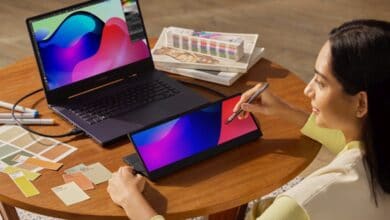
No matter if tablet, smartphone or notebook. More and more devices are now equipped with a blue light filter, which is supposed to be a guarantee for eye-friendly work. The Society for Ophthalmology has now spoken out on this topic and announced that there is no reason to worry. Blue light is completely harmless to our eyes.
Blue light filters as a flagship
Be it the resolution of the smartphone camera or the pixel density of a display. Manufacturers in the consumer electronics sector have to stand out from the ever-growing competition in an increasingly competitive market. Especially for notebooks and monitors, the blue light filter has been the key to success for a few years now. This should ensure that you can look at a screen for several hours at a time without damaging your eyes. Over time, many other devices that are not used for work, but primarily for general media consumption, jumped on the bandwagon. After all, alleged health protection is always a good reason to buy.
With the blue light filter, the amount of allegedly harmful blue light is filtered out of the displayed screen content and thus reduced. The end result is a warmer picture. To make the investment in the health feature worthwhile, the manufacturers had the filter certified in a presentable way. The end result was a seal from TÜV or another testing company emblazoned on the packaging of the technical device. Now it has become apparent that the purpose of corresponding filters must be questioned anew. After all, the German Ophthalmological Society (DOG) has now made public that the protection of the eyes is more or less pointless.
Marketing-speak or content?
The Society of Ophthalmology affirms in its statement that blue light has no negative effect on the eyes. They even go so far as to deny the commonly held thesis that blue light leads to poorer sleep. In principle, there is a connection between blue light and sleepless nights, but the light intensity of conventional electronic devices is so low that no effects can be assumed. However, this does not at all mean that a long time in front of a screen is not harmful to the human eyes. One would like to clarify only that not the blue light standing in the criticism for a fast fatigue of the eyes is causal.
Extensive testing
The DOG, as a conglomerate of eye experts, naturally backs up its statements. For example, it said, test subjects were fitted with and without contact lenses that have a special blue-light filter as part of an experimental setup. In the final result the contact lenses had no influence on the degree of the fatigue, under which the eyes suffered. Similarly, no effect was found on sleep patterns. In a public statement, the chairman of the DOG Hagen Thieme was almost incensed by the marketing behavior of many manufacturers. He believes that these are false reports that lead to uncertainty on the part of consumers.
What helps now?
Of course, the scientists have not only wanted to make clear that a blue light filter does not protect against eye fatigue. On top of that, they let it be known what precautions one can take to protect one’s own eyes. In particular, the brightness of the display plays a decisive role in protecting the eyes when using technical devices. So, if you want to work late at night or watch YouTube in bed, it is more important to turn down the brightness than to activate the blue light filter.



